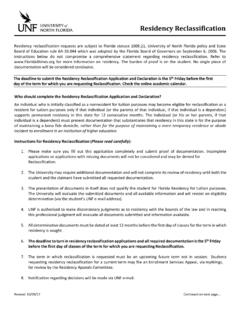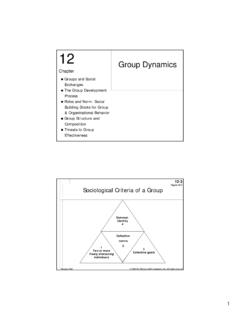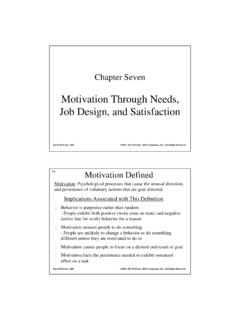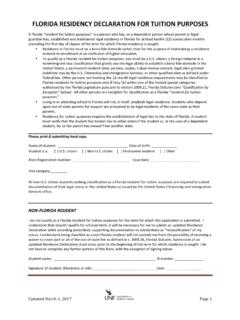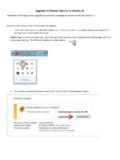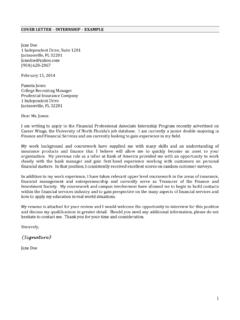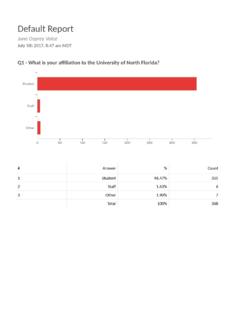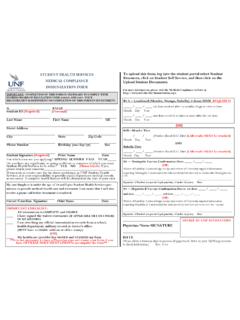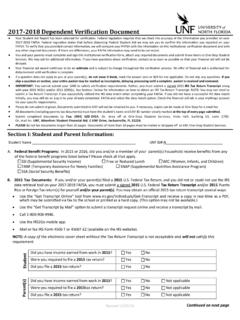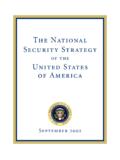Transcription of Understanding ethical decision-making
1 PAD 6436 lecture 2 Page 1 of 8 university of north florida Master of Public Administration program PAD 6436 Ethics Fall 2017 Understanding ethical decision - making Public manager of the week Photo credit Terry Cooper Lecture goals: Look at three views of ethical decision - making : Cooper s macro-level, big questions in administrative ethics; his chapter two attempt to understand ethical decision making ; and finally, Amartya Sen s views on fairness, through the lens of Rawlsian justice. Thompson and Leidlein Chapter 2 (selected questions) 1: Did Burns turn his back on the people who elected him? 2: Was it proper for him to serve on the City s bargaining board? 3: Was it proper for Burns to hint to the police union that they should put concerns about the chief on the bargaining table? Chapter 3 (selected questions) 1.
2 Was the Mayor unethical by being overly involved in the police department? 2. Did the City Manager politicize the interview process with the blue ribbon panel? 3. Would it have been more ethical for the City Manager to have an open selection process than a closed one? 4. Was Chief Grover s termination an illegal constructive termination because of his race? 5. What would be the likely community reaction if the City Manager had trusted his gut and appointed Carson? 6. What could the City Manager have done better? 7. How should the City Manager have handled the racial overtones of the Mayor, and efforts of he and allies to undermine the Police Chief? 8. What action could the City Manager have taken to address the Mayor s hands-on approach to his job? PAD 6436 lecture 2 Page 2 of 8 Cooper s big questions What are the normative foundations for public administration ethics?
3 Cooper offers some options: The Constitution (and the Supreme Court s interpretation of it?): for John Rohr, these values are freedom, equality and property. Others: o The preamble, which indicated why we ordained and established this constitution of the United States of America: We, the people of the United States, in order to form a more perfect union, establish justice, ensure domestic tranquility, provide for the common defense, promote the general welfare, and secure the blessings of liberty to ourselves and our posterity o Articles I III: Limiting government through dispersal (separation) of powers. o Article I, Section 8: The Congress shall have the power to Lay and collect taxes, duties, imposts and excises, To pay the debts And provide for the common defence and General welfare of the United States.
4 To regulate the several states. o Amendment I: Congress shall make no law respecting an establishment of religion, or prohibiting the free exercise theroef; or abridging the freedom of speech, or of the press; or the right of the people peaceably to assemble, and to petition the Government for a redress of grievances. o Amendment II: A well regulated militia, being necessary to the security of a free state, the right of the people to keep and bear arms shall not be infringed. o Personal freedom from arbitrary government: Amendment IV (protection from unreasonable searches and seizure), Amendment V (due process of law), Amendment VI (right to speedy trial, witnesses, etc.), Amendment VII (right to trial by jury), Amendment VIII (excessive bail or fine, cruel and unusual punishment). o Amendment X: The powers not delegated to the United States by the Constitution, nor prohibited by it to the states, are reserved to the states respectively, or to the people.
5 O Amendment XIII-XV: Reconstruction Amendments. Citizenship theory: The public administrative role is viewed as derived from that of the citizen, thus making administrators representative citizens, professional citizens, fiduciary citizens, or citizens in lieu of the rest of us (Cooper, p. 397). o Luiz Carlos Bresser Pereira, who we will read in week seven, emphasizes as well the duties of citizens. Social equity: the focus here is on a deeper meaning of equality . After all, does anyone believe that American credo that: We hold these truths to be self evident, that all men are created should not have applied to women and African-Americans, as well? As well, were Donald Trump and Lonzie Barton created with an equal shot at the American dream? Virtue: character! PAD 6436 lecture 2 Page 3 of 8 The public interest: Are you acting on behalf of broad shared interests or limited particular ones?
6 (p. 399). o Beyond this, I like to argue that MPA graduates, as well as many public servants, know more about the public interest than do the public. For instance: The destination of the plane having been determined by passengers (as reflected in their market choice of ticket purchases), who would you trust to make a decision about the design of an airplane: a vote of airline passengers, or someone with a graduate degree in aeronautical engineering? The goal of policy having been determined by citizens, who would you trust to make a decision about the design of a public policy: a vote of citizens, or someone with a graduate degree in public administration? How do American administrative ethical norms fit into a global context? Cooper suggests a handful of administrative ethical universals: self determination, freedom, honesty, trust, and stability (p.)
7 399). From what it s worth, I m skeptical, fear that there are many more administrative universals (see EBSCO link). However, perhaps the one difference between the US and the rest (or most of the rest) concerns the balance between individual and collective obligation. We saw that in Table 1 of last week s lecture: the US has the highest inequality, and lowest social spending, of any rich country. Put another way, we are the country least committed to the values of promoting the general welfare (as we have seen, this is contained twice in the US Constitution: Preamble, and Article I, Section 8) by doing unto the least among us (Matthew 7:12; Luke 6:31, etc.). This 1 Sources: a) Geert Hofstede s Cultural Dimensions index. b) Fraser Institute and Cato Institute s 2010 Economic Freedom of the World Report.
8 The data is on a 1-10 scale, with 10 equal to more economic freedom ( less government meddling ). The data are for 2008. c) Organization for Economic Cooperation and Development, Statistics Portal. The figure is Public Social welfare spending as a percentage of GDP, and includes spending on old age, survivors, disability, health, family, unemployment, housing, and other social areas. d) United Nations Development Program s 2010 Human Development Report. The numbers are a Gini coefficient, which measures inequality. Higher scores indicate more inequality. The data can be found on pages 152-5. Table 1 Individualism1 Hofstede s Individualisma Economic freedomb Social expenditurec Inequalityd G7+ US 91 Australia 90 Canada 80 France 71 Germany 67 Italy 76 Japan 46 Sweden 71 UK 89 BRICs Brazil 38 -- China 20 -- India 48 -- Russia 39 -- PAD 6436 lecture 2 Page 4 of 8 individualism is also evident in a series of indicators developed by Geert Hofstede.
9 I ll add this to other individualism indicators in Table 1, below: How can organizations be designed to support ethical conduct? This is clearly an important focus of Cooper s The Responsible Administrator, with its structure around a design approach to ethics in an organization. A sense of the (perhaps over-stated) importance of this design is evident in some of the passages in this section of the paper: During the late 1960s through the 1970s, the tendency of large bureaucratic organizations to stifle conscience and punish those who called attention to corruption and misconduct became painfully evident (Cooper 2004, p. 400). Scott and Hart raised the specter of a fascist state growing out of the oppressive nature of large bureaucratic organizations (p. 401). o How does this read in the US today.
10 If there is a risk of a fascist state in the US, does its origins lie in large bureaucratic organization stifling conscience? Alberto Guerreiro Ramos argued for organizational delimitation in The New Science of Organizations in 1981 because organizations threatened to dominate their employees lives with an emphasis on a narrow market mentality that would turn them in to economic maximizers devoid of appreciation for the qualitative side of human existence outside the workplace (p. 401). As indicated, these concerns were probably over-stated, as even Guerreiro Ramos qualified his criticism of market decision - making : The alternative model of social science outlined in this book is not anti-market. Moreover my criticism of contemporary market-centered society should not be interpreted as an advocacy of the elimination of the market as a functional social system.
